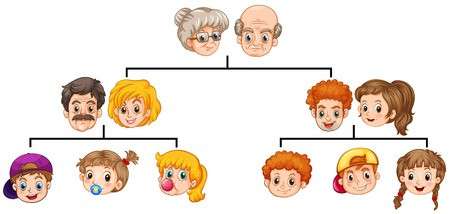If a Canadian dies without a Will, they have left a bit of a mess for their loved ones, and sadly missed out on an opportunity to distribute their assets in a meaningful way. Instead of recognizing friends or organizations that have made an impact on their life, they have left all of the planning to their Provincial government who have already decided how the assets will be divided. It may come as a surprise however, to learn that every Province is different and that there are some very inaccurate assumptions. In this post we will run through a few scenarios, and highlight some Provincial differences.

Copyright: iimages / 123RF Stock Photo
Let us start with the most common misconception;
If you are married, then your entire estate will go to your spouse.
In all Canadian Provinces, if you have no children, then this is indeed that case – your spouse will receive everything. Even in this situation, it is advisable to have a Will in place because the process without a Will can be delayed by as much as a year. As soon as you have children though, the distribution becomes very convoluted.
If you have one child then the first thing that will happen is that an estate administrator will be appointed, and hopefully the spouse and child can agree on this. Then the estate will be distributed according to Provincial law. In Ontario the spouse will receive the first $200k, and then the spouse and child will equally split everything above $200k with the child receiving all of their share at the age of 18. In BC, the spouse receives a “life interest” in the home, the first $300k and the remainder divided equally between spouse and child, with the child receiving their share at 19. In Alberta and Manitoba the children receive nothing.
If you have a spouse and more than one child, the spouse receives one third of the estate above the $200k or $300k with the remainder shared between however many children there are. Again, in Alberta and Manitoba the children receive nothing.
If you do not have a spouse or child, then the order of inheritance will be in order; parents, siblings, nieces and nephews. If there are no relatives, then the estate will be passed to the government.
Common-law spouses and inheritance
But what if you are not married, and living as a common-law couple. Well, if you do not have a Will then you should hope that you live in BC, Saskatchewan, Manitoba, NWT or Nunavut. If you have lived together for more than 2 years in a “married-like” arrangement then in these Provinces or Territories, then you will receive the same rights as a married spouse, however, in all other Provinces including Ontario, you will receive NOTHING (unless you can make a claim to the courts as a dependent, which can be costly and time-consuming). But even if you live in a province that recognizes common-law relationships, don’t be surprised if other family members put up a fight.
The problem of dying without a Will
Leaving the distribution of your estate to Provincial laws is a risky if not, irresponsible approach. Here are some key powers that a Last Will and Testament will give you.
- Writing a Will allows you to decide who receives which parts of your estate, including allowing you to include friends, charities or organizations.
- It minimizes family disputes over perceived entitlements
- It allows you to name an Executor or Trustee to take care of the administration of the estate
- It allows you to protect a common-law spouse
- It allows you to determine the ages at which minors receive their inheritance
- It allows you to name a guardian for your minor children.
- It allows you to create alternate plans in case you are involved in a common accident.
As you can see, there is never a good reason to not write a Will, but the task is often put-off because it is expensive or inconvenient. We are trying to address this with the Last Will and Testament service at LegalWills.ca by helping you to write your own Will, from the comfort of your home, for only $34.95. The whole process takes about 20 minutes.
Once you download and print the document, just sign it in the presence of two adult witnesses and you will have your fully legal Will.
- All about Trusts – how to include a Trust in your Will - June 9, 2022
- The Holographic Will – what is it and when should you use one? - May 18, 2022
- A Government of Canada Will Kit – Does it exist? - April 20, 2022













